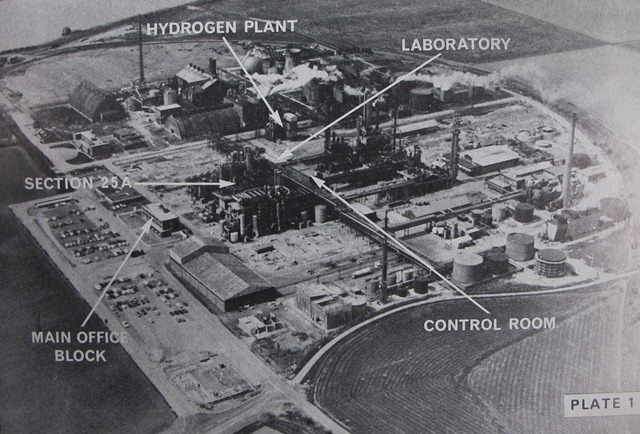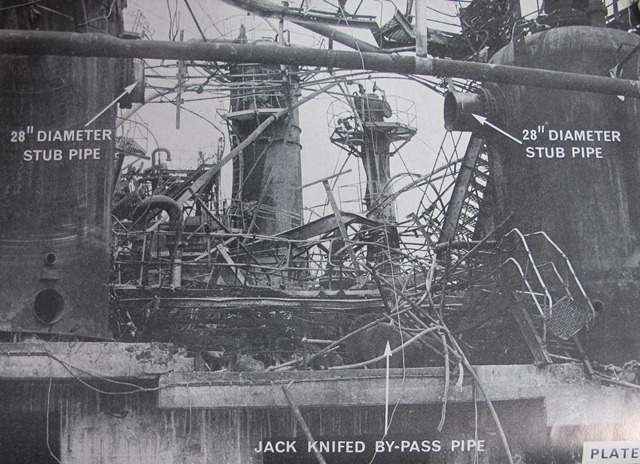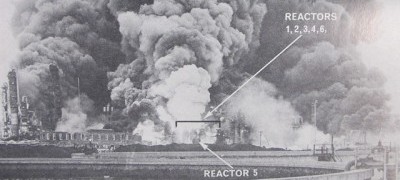1 June is the 40th anniversary of the Flixborough disaster, an explosion at a chemical plant sited on the banks of the River Trent in Lincolnshire. It was the biggest explosion to ever occur in Britain (during peacetime), until the fire at the Hertfordshire oil storage terminal (Buncefield) in December 2005. At Flixborough, 28 workers were killed and 36 others onsite suffered injuries. Outside the works, injuries and damage occurred on a widespread scale but there were no fatalities. It was recognised that the number of casualties would have been even higher had the incident occurred on a weekday.
The explosion was estimated to be equivalent to 16 tonnes of TNT and the subsequent fires raged for ten days. A considerable amount of property was destroyed in Flixborough and the surrounding villages, and the explosion was heard over 30 miles away in Grimsby. The Atomic Weapons and Research Establishment at Aldermaston produced a report on the infrasonic and seismic waves which resulted.

The Flixborough Plant before the explosion - official report, TS 84/37/1
Massive explosion
The plant, owned by Nypro UK, produced caprolactum, a chemical used in the manufacture of nylon. Some two months before the disaster, a crack was found in one of the reactors. A pipe was installed to bypass the leaking reactor so that the plant could continue production. During the late afternoon on 1 June 1974 the temporary bypass pipe ruptured, and a huge quantity of cyclohexane leaked from the pipe, forming a vapour cloud which then found a source of ignition. The massive explosion destroyed the plant. Eighteen fatalities occurred in the Control Room as a result of the windows shattering and the roof collapsing.

The Flixborough Plant after the explosion - Official Report, TS 84/37/1
Official Report
The official report into the accident (published in 1975) found that the bypass pipe had failed because of unanticipated stresses in the pipe during a pressure surge – the pipe had been inadequately supported, and the modification had been made without a full assessment of all the potential factors. Following the disaster there was a huge public debate about the safety of industrial plants and regulations regarding industrial processes were made considerably more rigorous – the newly formed Heath and Safety Commission took a close interest in these developments.

Reactors 4 and 6 soon after the explosion - Official Report, TS 84/37/1
New theories
New theories about the causes of the disaster have been advanced since 1975, notably by engineer Ralph King and Dr John Cox. Ralph King suggested that a reaction between water (which had settled in one of the reactors) and the hot cyclohexane above it caused a massive rise in pressure that blew apart the piping. The causes of the disaster were complex (it is impossible to do justice to all the technical explanations here) and the debate continues.

The fires as seen from the south-west - Official report, TS 84/37/1
Documentation
The National Archives holds a great deal of documentation about the disaster and its aftermath, including numerous plans, drawings, photographs and witness statements as well as the Report of the Court of Inquiry. Witness statements include vivid accounts by onsite workers – powerful testimony describing the sudden descent into hellish conditions, and nightmarish experiences, such as this extract from a statement: ‘I felt the blast from a terrific explosion which had occurred somewhere behind me. The blast was such that it threw me full length across the road. Debris then began to fall all around me and I was covered with oil which fell out of the sky’ (LAB 104/387).
Evidence such as this conveys the horrific nature of that cataclysmic explosion 40 years ago – a terrible tragedy that had a major impact on health and safety practices in the UK.
I was stationed in RAF Scampton when the disaster occurred, and I certainly heard the explosion. Soon after, during an evening dance at RAF Scampton, the duty SNCO stopped the dance and called for volunteers to help with the disaster. Many of those Royal Air Force personal at the dance went to help and the local nurses that were there returned to their posts at Lincoln Hospital to help deal with the emergency.
My grandfather in Grimsby heard the explosion and thought it was very strange thunder. My other grandfather in Scunthorpe said it blew the front door open. I was a young child at the time and remember the veil of tragedy that fell over that part of Lincolnshire. One of the teachers at my school lost a relative in the explosion.
I remember that day very well,I was breaking a young pony at Barrow Haven near the bank of the Humber, a very loud explosion followed by a plume of smoke. There was a lot of discussion after as the chemical past though the local villages in tankers
I was News Editor of The Sunday Times when the explosion happened. We were between editions and cleared as much space as we could to cover it. We hired an aircraft from Biggin Hill for aerial photos and hit the phones. Fortunately, I had a technical report about Flixborough in a personal file I kept in the event of such crises. It contained graphic information about the plant which gave us an invaluable insight into its construction. It was so informative, we had an argument about whether to focus on the disaster itself or the possible causes of it. I won that skirmish with a more senior editor, a rare event, and look back on that tragic night satisfied that we did everything we could to beat the clock and the opposition.
Flixborough brings back memories of when I was Chartering Manager at British Steel Corporation and, until the new iron ore berth was completed at Immingham, in the early 70s we were forced to tranship iron ore at Rotterdam and bring it to Flixborough to feed the steel works at Scunthorpe.
We had a contract with a Hamburg firm and, if my aged memory serves me correctly, we were bringing in 30,000 tonnes a week in small coasters. We used to have one ship alongside and one or two waiting in the Humber to come up the Trent on the tide. Flixborough did us proud – a remarkable little port.
[…] National Archives: The Flixborough Disaster includes links to the official report on the tragedy, which you can also find […]
I was a serving police constable in Humberside Police and at the time of the incident
I was shopping in Baxtergate Doncaster with my family when we heard the explosion.
On returning home to Goole I was called in for duty and with other officers carried out
anti looting patrols through the night.
I was having tea at my Grandparents on that day,I was 12 and the pre-fab on the Nunsthorpe shook,we thought the oil refinery had exploded,when we found out it was Flixborough we were very worried because my Uncle Paul Norvock worked there,he was due to go in on the next shift so survived thankfully,still remember the twisted steel when we drove past weeks later
I was 9 years old and was on a merchant ship that was berthed by a pub on that late Saturday afternoon. I remember the blast rocked the ship and blew out car windscreens parked in the pub lit.
I was in the Flixborough explosion, I worked in the Sulphate of Ammonia plant.
Myself and a fellow worker Colin Shipley, made our way over to Flixborough wharf from where we were ferried up to Scunthorpe General Hospital.
Instead of receiving treatment, a senior police officer seeing us in white overalls decided we should go on traffic duty at the hospital entrance. Colin and I never got inside the hospital that day instead we spent two to three hours in shock at the front of the hospital. Years later and even now I feel a certain animosity towards that police officer.
I have published on my blog the last ever copy of the company magazine ‘Nypress’.
https://jimzglebeblog.blogspot.com/2012/02/flixborough-first-of-june-1974-for_16.html
Also at the bottom of that page is a lament I composed for the 40th anniversary.
I’m reproducing that here for posterity.
Every June the 1st is always a reflective day for me.
Lament for the 28 souls of Flixborough.
we went to work and said hello,
recorded data high and low,
did litmus tests and cleaned out sumps,
turned on the ethanol transfer pumps,
as C.P.O’s we did our tasks and when required
wore safety masks
on our breaks we talked a lot
of football, films and vodka shots
a routine day was going well
then came the catalyst straight from hell
this was no genie with wishes three
this was Satan on a killing spree
a day to remember for ever more
was the first day of June in 74
it took no more than the blink of an eye
for twenty eight souls to fade and die
the carnage was cleared, goodbyes were said
we grieved and mourned and buried the dead
it’s forty years later, a time to reflect
when we the survivors should show our respect.
Further to my last comment, I also published on my blog the statement I gave to the police as well as my own feelings regarding the disaster.
https://jimzglebeblog.blogspot.com/2012/02/flixborough-first-of-june-1974-for.html
There are also pictures from local and national newspapers on that same post.
I was involved in the construction of the plant working on the installation of the control instrumentation.
The use of nylon multitube for control was something different to most Petro Chem plants I had worked on, copper tubing was the most common method of supplying Instrument air to control valves etc.
In the case of the fire these nylon tubes would have failed rapidly thus losing control of some instrumentation and valves
Also, the position of the Control room was in the centre of the unit with large glass windows overlooking the plant (as I recall) which was not the correct location for a plant of this type, in my opinion
It was the annual Appleby Frodingham Gala in Central Park in Scunthorpe that Saturday afternoon, and I was walking home from it when Nypro exploded. I remember the pressure wave exploding window panes and showering people with glass.
Regarding Nypro’s Control Room, years later I recall talking to a survivor and he said that because the Control Room was in a bunker some thought it would be OK to shelter there. He decided to run through the plant and eventually out to safety. Nobody got out of the Control Room alive.
My childhood home, and subsequent parental home at the time of the explosion, was in the village of Amcotts, which lies on totally flat ground immediately across the river Trent from Flixborough Wharf and the Nypro factory. The topographic position of the village of Flixborough was partly sheltered from the explosion pressure wave by slightly higher ground between the village and the factory, and although there was destruction and deaths in a few houses closer to the factory, the bulk of Flixborough escaped with less damage than occurred in Amcotts. Every window in our house was shattered, as indeed were almost all windows in the village, and there was substantial damage to roof and rafters. The biggest single insurance compensation payout after the disaster was for restoration of St.Mark’s Church in Amcotts ( over £1,000,000), where the roof of the church had been raised then dropped back down 15 inches out of place. Inhabitants of Amcotts felt they had been disregarded, as all the publicity and national news coverage concentrated only on mentioning Flixborough where the deaths had occurred.
My Grandfather lived in Amcotts, and his bedroom window looked straight out across the Trent towards Nypro. My mother and I happened to be in the car in Scunthorpe when it happened, and arrived in Amcotts before the emergency services. Grandad said had seen a flame and was on his way to look out of the window when the explosion happened. There was a huge shard of glass from the window embedded in the wardrobe in that room.
My brother was arranging a window display in a wine shop in Scunthorpe. All windows on that road were broken save for his. The floor had been mopped and doors on either side of the window were open- the blast blew through.
I was 8 years old at the time
And on saturday afternoons wed come from our home in elsham to shop and visit my grandparents on cottage beck road. Id broken my leg and wasnt mobile so id stayed with my grandparents while my brother sister and parents went io town. They were stood outside Binns went the explosion occured , i remember my dad saying he grabbed my sister and sheltered her as the windows came out and dropped, theyd only fitted the windows that week! I was stood in the kitchen on cottage beck road , the door was open but slammed shut and all the windows blew open and the (what i learnt as i grew older) pressure wave blew me off My feet. I worked as a petrol tanker driver in my career and i still got the wobbles if i hear any loud bangs ir explosions .
I send My deepest sympathy to
Anybody who lost someone special or were injured of this man made tragedy 50 years ago this year. Many lessons were
Learnt but far too late
Nobody has mentioned the terrible way that compensation for loss of life was worked out. Apparwntly you were worth more if you were a married man as opposed to being a single man. Disgusting!! and would be unacceptable today. The Nypro firm got away with an awful lot in my opinion
I worked at nypro up to 6 months before in the storage shed at the front were they kept the overflow I can remember excatly what I was doing, I had just moved to kent and was in the garden errecting a new greenhouse listerning to the radio and it came over the airwaves as breaking news, to this day I do think about it the shed I worked in was flattend and of cause i can speculate weather I would have been on shift or not but having worked in other areas of the plant I feel sorry for the guys who lost there lives some I must have known by sight and in some cases never found it was a sad day for all involved